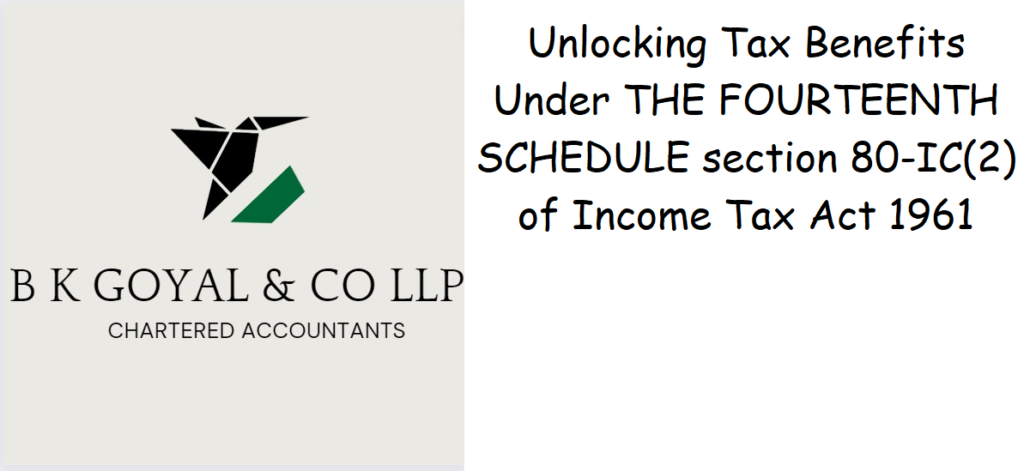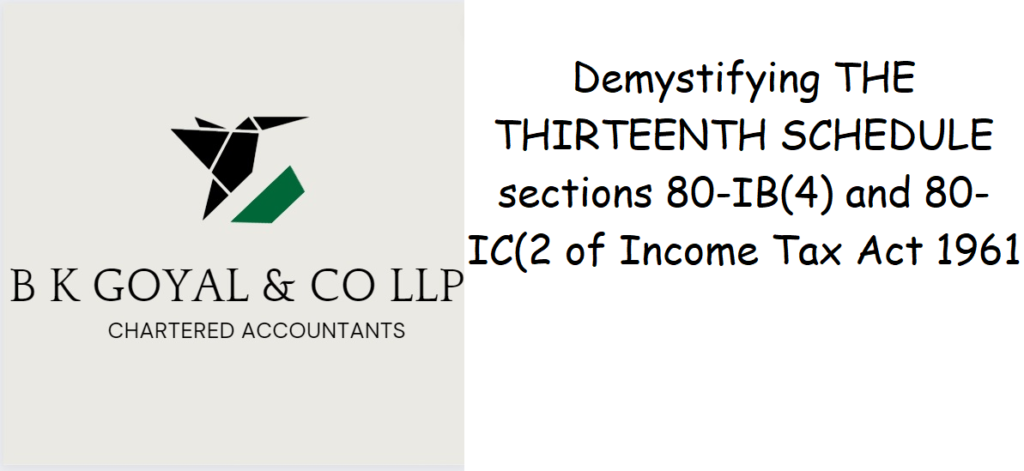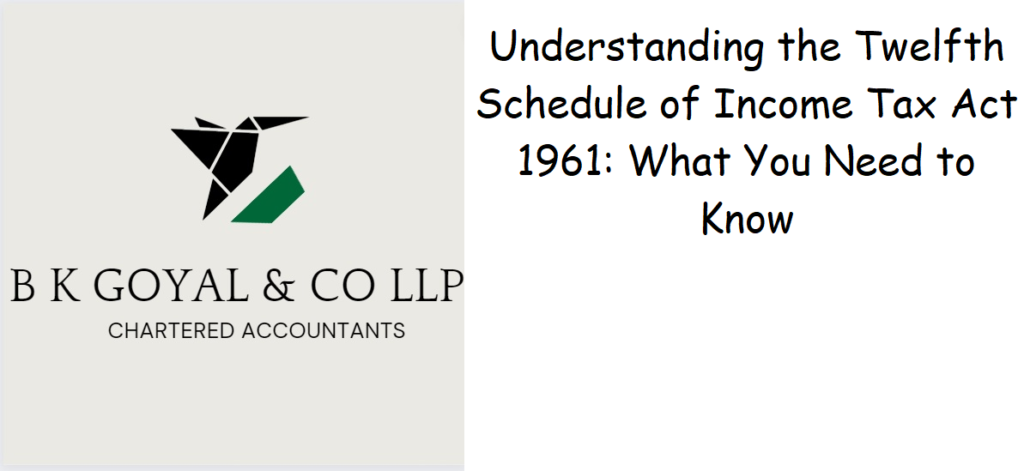Unlocking Tax Benefits Under THE FOURTEENTH SCHEDULE section 80-IC(2) of Income Tax Act 1961
Introduction Are you looking to understand about Unlocking Tax Benefits Under THE FOURTEENTH SCHEDULE section 80-IC(2) of Income Tax Act 1961 ? This detailed article will tell you all about Unlocking Tax Benefits Under THE FOURTEENTH SCHEDULE section 80-IC(2) of Income Tax Act 1961. Hi, my name is Shruti Goyal, I have been working in the field of Income Tax since 2011. I have a vast experience of filing income tax returns, accounting, tax advisory, tax consultancy, income tax provisions and tax planning. Paying taxes is an essential obligation of every citizen, and we all want to make sure that we are paying the right amount of tax. Fortunately, the Indian government has introduced various tax-saving provisions to encourage people to invest in certain sectors and industries. One such provision is THE FOURTEENTH SCHEDULE section 80-IC(2) of Income Tax Act 1961. Under this section, eligible companies can avail of tax benefits by setting up and operating new manufacturing units in certain areas. In this blog, we will discuss the benefits of THE FOURTEENTH SCHEDULE section 80-IC(2) of Income Tax Act 1961, the eligibility criteria, application process, and FAQs. Benefits of THE FOURTEENTH SCHEDULE section 80-IC(2) of Income Tax Act 1961 Tax holiday for eligible companies The most significant benefit of THE FOURTEENTH SCHEDULE section 80-IC(2) of Income Tax Act 1961 is the tax holiday provided to eligible companies. Companies that set up new manufacturing units in certain areas are eligible for a tax holiday for a specific period. The tax holiday is for a period of five years from the year in which the manufacturing unit starts its production. The period of tax holiday can be extended for another five years if the company meets the prescribed conditions. Deduction from profits In addition to the tax holiday, eligible companies can also claim a deduction from their profits. The deduction is equal to 100% of the profits derived from the eligible business. The deduction is available for five years from the year in which the manufacturing unit starts its production. The deduction can be extended for another five years if the company meets the prescribed conditions. No minimum alternate tax Another significant benefit of THE FOURTEENTH SCHEDULE section 80-IC(2) of Income Tax Act 1961 is that eligible companies are not liable to pay minimum alternate tax (MAT). MAT is a tax levied on companies that have claimed deductions or exemptions under the Income Tax Act but have not paid any tax on their profits due to various tax incentives. Eligibility Criteria To avail of the benefits under THE FOURTEENTH SCHEDULE section 80-IC(2) of Income Tax Act 1961, a company must meet the following eligibility criteria: The company must be registered as a company under the Companies Act 1956 or Companies Act 2013. The company must set up a new manufacturing unit in any of the following areas: States of North Eastern Region, including Sikkim State of Jammu and Kashmir State of Himachal Pradesh State of Uttarakhand State of Uttar Pradesh State of Bihar State of West Bengal State of Odisha State of Jharkhand State of Chhattisgarh State of Madhya Pradesh State of Rajasthan State of Gujarat State of Maharashtra State of Andhra Pradesh State of Telangana State of Tamil Nadu State of Karnataka State of Kerala The company must not have been formed by splitting up or reconstructing an existing business. The manufacturing unit must start production on or before 31st March 2023. The company must not have been formed by transferring machinery or plant from any other existing unit. Application Process To avail of the benefits under THE FOURTEENTH SCHEDULE section 80-IC(2) of Income Tax Act 1961, a company must follow the below-mentioned application process: The company must first obtain a certificate from an authorized officer in the state government or union territory where the manufacturing unit is located. The certificate must confirm that the company has set up a new manufacturing unit in the eligible area and that it meets the prescribed conditions. The company must then file an application with the assessing officer of the Income Tax Department, along with the certificate obtained in step 1. The application must be filed in Form 10-IE. The assessing officer will then verify the details mentioned in the application and the certificate. If the assessing officer is satisfied with the details mentioned in the application, he/she will issue an order allowing the company to claim the benefits under THE FOURTEENTH SCHEDULE section 80-IC(2) of Income Tax Act 1961. FAQs Can a company avail of the benefits under THE FOURTEENTH SCHEDULE section 80-IC(2) of Income Tax Act 1961 if it sets up a new manufacturing unit in an area not mentioned in the eligibility criteria? No, a company can only avail of the benefits under THE FOURTEENTH SCHEDULE section 80-IC(2) of Income Tax Act 1961 if it sets up a new manufacturing unit in one of the eligible areas mentioned in the section. Can a company claim a deduction under THE FOURTEENTH SCHEDULE section 80-IC(2) of Income Tax Act 1961 if it does not make any profits? No, a company can only claim a deduction under THE FOURTEENTH SCHEDULE section 80-IC(2) of Income Tax Act 1961 if it makes profits from the eligible business. Can a company claim both the tax holiday and deduction under THE FOURTEENTH SCHEDULE section 80-IC(2) of Income Tax Act 1961? Yes, a company can claim both the tax holiday and deduction under THE FOURTEENTH SCHEDULE section 80-IC(2) of Income Tax Act 1961, provided it meets the prescribed conditions. Conclusion THE FOURTEENTH SCHEDULE section 80-IC(2) of Income Tax Act 1961 provides significant tax benefits to eligible companies that set up new manufacturing units in certain areas. The benefits include a tax holiday, deduction from profits, and exemption from minimum alternate tax. To avail of these benefits, a company must meet the prescribed eligibility criteria and follow the application process. If you are planning to set up a new manufacturing unit in one of the eligible areas, make








